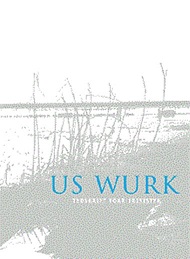Rûtine en ritueel. It dichtsjen fan Obe Postma
Abstract
In recent years many critics and literary historians have attempted to understand Obe Postma’s poetry primarily from his literary and scientific readings, and the philosophy he built from this. In this article, the review of a factual, and strictly chronologically told, new biography, written by Tineke Steenmeijer-Wielenga, as well as of a critical review of Postma’s volumes of poetry by Geart van der Mear, result in a different insight. Not Postma’s philosophy, but the way he practiced the writing of poems, provides understanding of his intentions. Postma used his walks around the Groningen and Frisian countryside, as well as his archival studies into the history of the region, as means to activate ‘historical sensations’ (a term introduced by the Dutch historian Johan Huizinga). The writing of poems on Sunday afternoons must have been an addictive ritual to the poet. Postma’s strolls are somewhat comparable to Marcel Proust’s famous Madeleine cookies: they both revive the feeling of happiness and fullness of days gone by.
In dichter wurdt troch it libben twongen om learaar te wêzen. Hy mei der net rjocht oer mar liedt dochs gewillich/net-gewillich dat geregelde, rûtineuze libben fan seis dagen yn ’e wike hurd wurkje te moatten. Om by te kommen en om út te rêsten makket er op snein leafst lange kuiers om – as hichtepunt fan de wike – it geniet fan wat sa’n kuier oprôp yn gedichten fêst te lizzen. Sa wie it libben fan Obe Postma, boeresoan, Fries om utens, learaar wis- en natuerkunde oan in Grinzer HBS en dilettant-histoarikus en dichter. It wie in lang libben, hast in iuw lang, en tagelyk in libben dêr’t it measte net yn foarfoel. Postma bleau libbenslang frijfeint en fiere reizen hat er net makke. Mar – en dat is de paradoks – troch syn dichterskip omfieme dat libben dochs alles: de wrâld, it lytse en it grutte, de minsken fan no en dy yn it ferline, Fryslân, de wrâld. Syn poëzy ropt dat ‘alles’ op.

